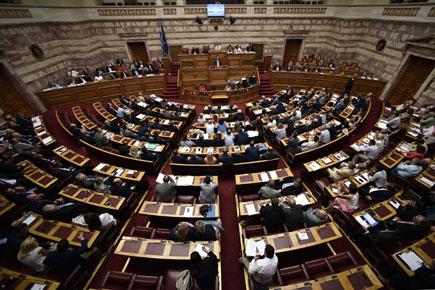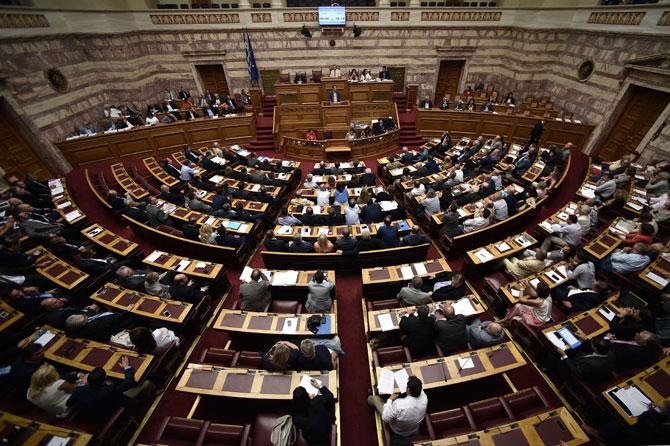Greek's parliament on Thursday approved an omnibus draft bill ratifying the debt deal the government reached with creditors on Monday

Athens: Greek's parliament on Thursday approved an omnibus draft bill ratifying the debt deal the government reached with creditors on Monday and the first round of reforms requested as prerequisites for the immediate release of international aid to avert imminent default and Grexit, media reports said.
ADVERTISEMENT
It was the first of several draconian austerity bills demanded by Greece's creditors as a condition for a third financial rescue of the heavily indebted nation, Efe news agency reported.
The vote, which came just before 2 a.m., was 229-64 with six abstentions.
Half of the "no" votes were cast by members of the governing leftist Syriza party, posing a major challenge to Prime Minister Alexis Tsipras, who was forced to rely on the opposition to pass the legislation.

Greek lawmakers attend a parliament session in Athens on July 15, 2015. Pic/ AFP
The 32 Syriza lawmakers who opposed the bill included Energy Minister Panayotis Lafazanis, erstwhile Deputy Finance Minister Nadia Valavani -- who resigned Wednesday -- and the former finance minister, Yanis Varoufakis, who quit the government last week.
Thursday's dramatic scene came less than three weeks after Tsipras went on Greek television to say that his government was turning down the proposal of the troika -- the European Union, European Central Bank and the International Monetary Fund -- and convening a July 5 referendum on the path forward.
To the surprise of many, more than 61 percent of those who cast ballots in the plebiscite voted to reject the troika proposal.
But instead of taking a harder line with the creditors, Tsipras and a majority of the cabinet decided to put forward a proposal capitulating to EU and ECB demands for additional austerity measures in a country whose economy has contracted 25 percent since 2010.
Before Thursday's vote in parliament, Varoufakis described the agreement that emerged this week from marathon talks in Brussels between Greece and its Eurogroup partners as "a new Versailles Treaty".
Tsipras pleaded for party unity in his speech before the vote, acknowledging that the terms of the agreement were harsh, but insisting that it represented the best choice available to Greece.
He said the position of the creditors left Athens with three options: accepting the deal; leaving the euro with the consent of the partners under a German proposal; or a disorderly exit from the single currency.
But even with parliamentary approval, the success of the deal is not assured.
The International Monetary Fund's repeated proclamations that the Greek debt is unsustainable suggest it might not be party to the arrangement, while Germany views IMF participation as essential.
Syriza won election in January on a promise to throw off troika-mandated austerity that has pushed Greece's unemployment rate above 25 percent even as the ratio of debt to gross domestic product has soared.
The latest estimate from the IMF calls for the Greek debt-to-GDP ratio to reach 200 percent over the next two years.
 Subscribe today by clicking the link and stay updated with the latest news!" Click here!
Subscribe today by clicking the link and stay updated with the latest news!" Click here!






